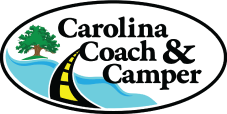How to Keep Your RV Comfortable & Cool
 One challenge will always daunt those who want to camp during the summer: heat. Especially here in North Carolina where temperature and humidity skyrocket in the summer months, managing the temperature in your RV can be quite a challenge. And while a huge air conditioning unit can cool things down, it's not very energy efficient, and not all RVs come with them. This guide is designed to show you how to keep things cooler on your next trip without the help of an air conditioning unit so that your trip will be more comfortable. Stop by Carolina Coach & Marine if you need parts and repairs for your RV or if you're looking at buying a new RV for yourself. Located in Charlotte, North Carolina, we're a great choice for customers in Winston-Salem, Asheville, and Spartanburg, North Carolina.
One challenge will always daunt those who want to camp during the summer: heat. Especially here in North Carolina where temperature and humidity skyrocket in the summer months, managing the temperature in your RV can be quite a challenge. And while a huge air conditioning unit can cool things down, it's not very energy efficient, and not all RVs come with them. This guide is designed to show you how to keep things cooler on your next trip without the help of an air conditioning unit so that your trip will be more comfortable. Stop by Carolina Coach & Marine if you need parts and repairs for your RV or if you're looking at buying a new RV for yourself. Located in Charlotte, North Carolina, we're a great choice for customers in Winston-Salem, Asheville, and Spartanburg, North Carolina.
Keeping Heat Out
Location can make an important difference in how hot your trailer gets. A major portion of heating comes from infrared light from the sun. The more direct sunlight you expose your trailer to, the hotter it will get. Parking in the shade will help to reduce the amount of direct sunlight. Another element to consider is the location of your campsite in the larger campground. Areas with more southern exposure will experience more hours of direct sunlight in the northern hemisphere. If you can find an area with no southern exposure, you'll get more protection from sunrise to sunset. When possible, try to find an area with a little bit of wind or air circulation, too. This will help the area cool down faster and move stuffy, humid air away from your trailer.
Another way to block infrared light from your trailer is to shade the windows as completely as possible. The best way to do this is with window shades. Full blackout curtains can be helpful, especially if you do the majority of your camping in the summer when heat is a constant battle. If not, simple blinds or Roman shades will work, too.
Avoiding Heat Production
If you're going through all the work of keeping heat out, you don't want to undo your work by heating your trailer up on your own. Certain activities and appliances will tend to generate much more heat than others. Two of the biggest sources in a trailer are the kitchen and the bathroom. From the oven to the stove top, a kitchen can heat up an entire RV in a matter of minutes. On a hot day, your oven might as well be a furnace. A pot of boiling water is another notorious heater thanks to the huge amount of humidity it produces. When possible, try to move your actual cooking outdoors using the grill, the campfire, and outdoor propane stoves when possible. You can also eat more raw and cool foods such as salads and sandwiches. If you insist on eating hot food, try using the microwave or slow cooker to minimize the amount of heat used.
The shower is another notorious RV heater. A hot shower will fill your RV with uncomfortable humidity, so try to take short showers that are as cool as you can stand, or better yet, shower outdoors.
Incandescent light bulbs are another common source of heat. If possible, try switching your lighting to LED lighting. The benefit is that not only will you limit heat production, you'll also get a much more energy efficient, longer lasting light bulb.
Ventilating Stored Heat
Preventing heat from entering and minimizing heat production are helpful, but when you want to actively lower the temperature of your RV, you'll need to ventilate whatever heat as entered your trailer. This can only be successful if there is cooler air outside your trailer than in or otherwise you'll simply draw in more hot air. For this reason, you should focus on nightfall and times when cool breezes pick up to try to ventilate your trailer. If you feel a cool breeze, try opening windows on opposite sides of the trailer to create a cross draft. Once night comes around, you'll want to throw open every window you can and start any fans you have.
Dealing with heat without the help of air conditioning is a pain, but it's not impossible if you take the time to keep the heat out, don't create heat inside, and ventilate your trailer when it's cool enough to replace hot air with cool air. You could also simply install a new air conditioning unit. Here at Carolina Coach & Marine, our service center will help you find a solution to your heating and cooling problems. Located in Charlotte, North Carolina, we proudly serve Winston-Salem, Asheville, and Spartanburg, North Carolina.
